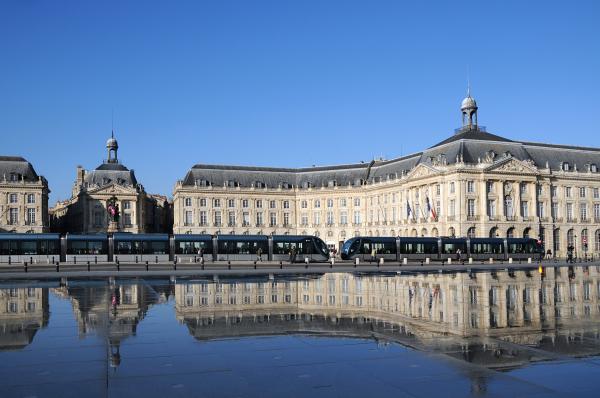
The European Investment Bank (EIB), the European Union's financing institution, is granting a EUR 200 million loan to Communauté Urbaine de Bordeaux (CUB) to extend its urban transport network.
Alain Rousset, Chairman of CUB, and Philippe de Fontaine Vive, EIB Vice-President, signed a first EUR 120 million financing agreement on 1 July 2005 in Bordeaux. Further agreements may be entered into in association with the Communauté's banking partners.
The loan will be devoted to extending three existing tram lines, which have been in use since 2003/2004: line A, linking the west of the city (Mérignac) to the centre of Bordeaux via the Pont de Pierre and on to Carbon-Blanc and Floirac on the right bank; line B, to the west, will be extended to a new terminus in Claveau and will connect with the SNCF train station at Pessac; line C, which currently links St-Jean train station to the city centre, will extend northwards to Bordeaux-Lac and southwards to Les Bègles.
The expansion of the network by almost 20 km to a total of 44 km by 2008 represents the second phase of the Bordeaux Tramway Project, the cornerstone of the Greater Bordeaux area's urban transport plan. Adopted in 2000, it aims to boost the attractiveness of public transport with a view to reducing car use in the city and thereby improving the quality of urban life.
The EIB previously supported CUB's efforts aimed at easing traffic pressures in the city through its contribution to funding of the Rocade de Bordeaux project in 1983. On a wider scale, since as far back as the 1960s, the Bank has been assisting investment in the Aquitaine region, providing aggregate lending of nearly EUR 1 billion in favour of projects in a variety of sectors, notably transport, telecommunications and energy infrastructure as well as high-tech industries.
The EIB sees its lending in favour of exclusive lane public transport as part of its priority action to promote sustainable urban development, with the emphasis on reducing pollution and improving the quality of life in urban areas while at the same time encouraging economic expansion in towns. Thus, between 2000 and end-2004, the EIB lent over EUR 10 billion throughout the European Union for the development of urban transport. It has been involved in financing metros and tramways in cities such as Athens, Alicante, Barcelona, Bilbao, Brussels, Berlin, Valencia, Lisbon, London, Madrid, Munich, Düsseldorf, Manchester, Dublin, Budapest and Prague. In France, the EIB has provided funding of EUR 2.6 billion since the beginning of the decade for numerous urban transport projects, notably in Bordeaux, Lyon, Montpellier, Mulhouse, Nancy, Nantes, Orléans, Rennes, St Etienne, Strasbourg, Toulouse and Valenciennes.



